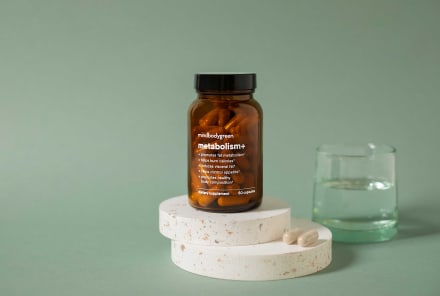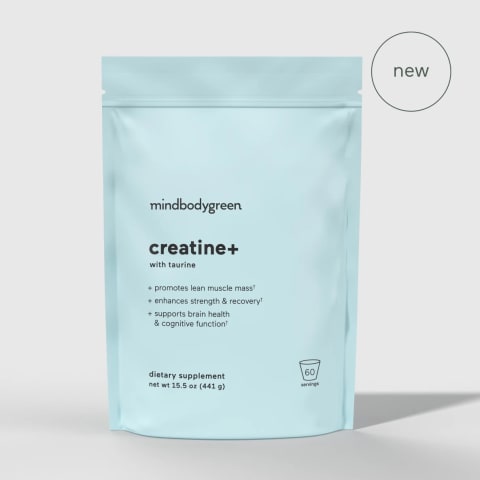Advertisement
Creatine Supplements May Improve Cognitive Performance After Sleeping Poorly, New Study Shows


The scene is all too common: You get a handful of hours of sleep, reach for a cup of coffee every few hours, and then still feel sluggish. But a new study published in Scientific Reports shows that something rather unexpected can perk up your brain power1 the day following a horrendous night's sleep.
And that something is the popular fitness supplement creatine.
Creatine's role in energy production
Creatine is one of the most studied and used supplements to enhance physical performance—mainly for its role in energy production.
You see, during times of high energy demand (like working out), creatine can be converted into adenosine triphosphate (ATP), the primary energy source for cells. And as 95% of the body's creatine2 is stored in the muscles, this compound is especially useful in helping your muscles go harder during exercise and efficiently recover afterward.*
However, the remaining 5% of the body's creatine stores are in the brain. And this organ is a major energy guzzler. More and more research is showing how taking creatine daily also supports high-energy cognitive tasks3.* And we all know (and feel) that after a poor night's sleep, our brains don't process information as quickly.
While most studies show that a daily 3- to 5-gram dose of creatine is most effective for physical and cognitive benefits, the researchers of this new study focused on the short-term effects of high-dose creatinine (around 24 grams) following a bout of short sleep duration.
It's impact on cognition (when sleep is lacking)
To do that, researchers had 15 men and women in their mid-20s practice a regular sleep schedule (going to bed at 11 p.m. nightly and waking up at 7 a.m.) for two weeks prior to the study.
Then, everyone went through two nights of limited sleep in a lab (total lying about three hours): one night taking a high dose of creatine and the other taking a placebo. These lab visits were at least five days apart so participants could sleep regularly and recover between sessions.
Everyone underwent cognitive tests before taking the placebo or supplement, and at three time points after.
And the result?
- Positive changes in brain metabolism and cognitive performance improved starting 3 hours after taking creatine
- Benefits seemed to peak around 4 hours after ingestion and lasted for nine hours total
- The biggest benefits were seen for processing capacity—the information or workload a person can handle at a time—and short-term memory*
Overall, these findings are pretty exciting, and it's impressive that a single dose of creatine may be effective at keeping you sharp after really not sleeping much.*
Properly dosing creatine
The kicker with this study, though, is that participants were given a pretty large dose of the supplement. Each participant was given 0.35 gram of creatine per kilogram of body weight. So for a 150-pound individual, that's about 24 grams.
That amount aligns with what is known as a loading dose4. Dosing to this extent is typically used in the short term to quickly increase the body's creatine access and stores. And after the body is properly "loaded," a daily dose of 3 to 5 grams is resumed.
So, this study isn't proposing that this large-dose creatine is a daily solution but rather indicating it could be a potential option to promote cognition following more extreme scenarios.* And there's also some speculation on whether longer-term supplementation of lower-dose creatine would result in more lasting (not just acute) benefits.
Finding the right creatine supplement
There's no shortage of creatine supplements to choose from, but there's none quite like mindbodygreen's creatine+. This formula combines 5 grams of creatine monohydrate with 2 grams of the amino acid taurine, which offers even more physical and cognitive performance benefits.*
This flavorless powder disperses easily in liquids and mixes great in smoothies, oatmeal, and yogurt. Women, in particular, are loving it for muscle and brain support.*
The takeaway
While this new study is exciting and further supports creatine's role in cognition, more research is still warranted, and you shouldn't jump into taking that large of a dose daily for energy.
Instead, if you are interested in creatine, start with the recommended daily dose of 3 to 5 grams of a high-quality creatine monohydrate (like creatine+).
Watch Next
Enjoy some of our favorite clips from classes
Enjoy some of our favorite clips from classes
What Is Meditation?
Mindfulness/Spirituality | Light Watkins
Box Breathing
Mindfulness/Spirituality | Gwen Dittmar
What Breathwork Can Address
Mindfulness/Spirituality | Gwen Dittmar
The 8 Limbs of Yoga - What is Asana?
Yoga | Caley Alyssa
Two Standing Postures to Open Up Tight Hips
Yoga | Caley Alyssa
How Plants Can Optimize Athletic Performance
Nutrition | Rich Roll
What to Eat Before a Workout
Nutrition | Rich Roll
How Ayurveda Helps Us Navigate Modern Life
Nutrition | Sahara Rose
Messages About Love & Relationships
Love & Relationships | Esther Perel
Love Languages
Love & Relationships | Esther Perel
What Is Meditation?
Box Breathing
What Breathwork Can Address
The 8 Limbs of Yoga - What is Asana?
Two Standing Postures to Open Up Tight Hips
How Plants Can Optimize Athletic Performance
What to Eat Before a Workout
How Ayurveda Helps Us Navigate Modern Life
Messages About Love & Relationships
Love Languages
Advertisement

It's Not Too Good To Be True — A Metabolism Product Reviewers Are Raving About
Molly Knudsen, M.S., RDN

New Study Reveals 2 Habits That Are Early Signs Of Muscle Loss In Women
Molly Knudsen, M.S., RDN

Like Pre-Workout But Hate The Jitters? This Caffeine-Free Option Is For You
Molly Knudsen, M.S., RDN

It's Not Too Good To Be True — A Metabolism Product Reviewers Are Raving About
Molly Knudsen, M.S., RDN

New Study Reveals 2 Habits That Are Early Signs Of Muscle Loss In Women
Molly Knudsen, M.S., RDN

Like Pre-Workout But Hate The Jitters? This Caffeine-Free Option Is For You
Molly Knudsen, M.S., RDN












